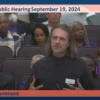Scripture References
Colossians 1:16-17; Acts 3:21
DART’s local congregation-based community organizations include congregations from a wide range of faith traditions including Christian, Jewish, Muslim and others.
Many valuable lessons can be learned about justice and God’s concern for the world when studying the Christian Bible. Jesus’ Sermon on the Mount, confrontations with the Scribes and Pharisees over their hypocritical ways, and lessons on money and the seduction of wealth all point to a persistent love and concern for all of God‘s creation. The New Testament offers great understanding about creation, human failings, and redemption.
During Bible Study, Christians learn that Jesus’ life was not simply a collection of valuable lessons and deeds, as important as these instructions are for our day-to-day living. Christians learn that Jesus was sacrificed for the redemption of a world that has fallen away from its holy creation. Conventional Christian teachings often view this sacrifice solely in terms of one’s individual salvation, so that Jesus’ sacrifice is limited to forgiveness for our personal transgressions. Many Biblical scholars would question this limitation and assert that Jesus’ death and resurrection promises redemption and transformation of the world including the political and economic systems we relate to every day (e.g., schools, healthcare industries, corporations, governments.).
Dr. Walter Wink, a Christian theologian and Professor of Biblical Interpretation at Auburn Theological Seminary in New York City, discusses this topic in his books on the “Powers and Principalities.” He writes in Engaging the Powers, “The Powers are the necessary social structures of human life, and it is not a matter of indifference to God that they exist. God made them… The Jesus who died at the hands of the Powers died every bit as much for the Powers as he died for people… Nothing is outside the redemptive care and transforming love of God. The Powers are not intrinsically evil; they are only fallen. What sinks can be made to rise again… We can love our nation or church or school, not blindly, but critically, recalling it to its own highest self-professed ideals and identities. We can challenge these institutions to live up to the vocation that is theirs by virtue of their sheer createdness.”
Christian leaders working with DART find that organizing together with other congregations provides a vehicle to pursue redemption for all God’s creation.
For further study on Redeeming the Individual and the Systems we encourage you to read Dr. Walter Wink’s Naming the Powers, Unmasking the Powers, Engaging the Powers, and The Powers That Be.





